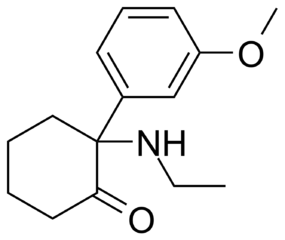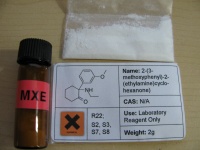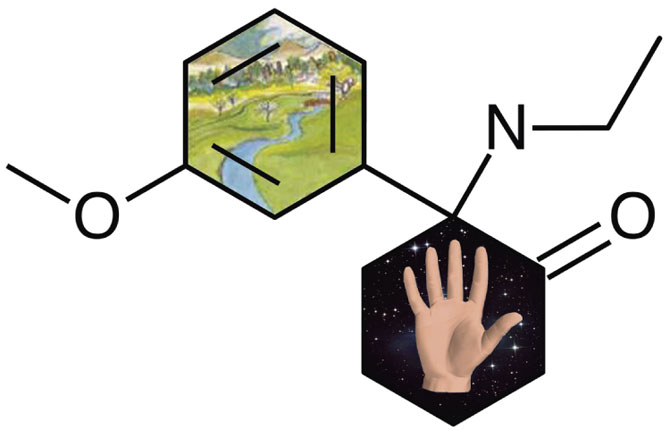MXE
Contents
Brief overview - What is MXE?
Methoxetamine or 3-MeO-2-Oxo-PCE; is a Dissociative/Psychedelic/Anesthetic.
- This compound is the birth child of rational drug design.
-It has a very short history of human use and possess mild stimulatory and opioid properties, it also creates muscular relaxation with a moderate to strong psychedelic dissociative effect. Caution is advised due to its short age, lack of research, and possible addictive properties.
Here's some good info on safe consumption of Methoxetamine
Chemical and physical properties
Methoextamine or (RS)2-(3-methoxyphenyl)-2-(ethylamino)cyclohexanone
Identifiers
CAS number - 1239943-76-0
ChemSpider - 24721792
Chemical data
Formula - C15H21NO2
Mol. mass - 247.33 g/mol
Solubility data
MXE HCl
soluble in distilled water 70mg/ml @ 20ºC
soluble in boiling water <150mg/ml @ 95ºC
soluble in isopropanol 90mg/ml @ 20ºC
very soluble in boiling IPA
soluble in methanol 120mg/ml @ 20ºC
very soluble in boiling methanol
practically insoluble in acetone 1mg/ml @ 20ºC
slightly soluble in boiling acetone
insoluble in cold acetone
insoluble heptane
insoluble in ether
MXE freebase
very soluble in diethyl ether
Effects
- Methoxetamine's effects vary for different people, usually when the dose comes on users notice slight sedation, relaxation of the muscles; perhaps some dopamine euphoria and stimulation. A feeling of disconnection followed by a strong desire to organize and sort internal and external problems. As the dose increases this desire turns to a very psychedelic introspection, almost as if one is falling in on themselves and being confronted with deep emotional dilemmas and problems.
- Methoxetamine causes visuals and auditory hallucinations at higher doses, you may feel very numb and disorientated; it's best to lay down in a comfortable location to reduce risk of tripping and hurting yourself, you may be so numb you might not feel it. In higher doses the visuals turn inwards, it's best to relax your breathing and close your eyes, you may feel like you are sinking or falling into a deep abyss of your mind. It's best not to fight these feelings and go with them, they may take you to wondrous lands; always have a partner on hand though to check up on your breathing at higher doses now and then.
- Methoxetamine is a friendly psychedelic and dissociative, replacing a lot of the uncomfortable come-ups from traditional psychedelics with warm, tingly, euphoria. For these reasons it may be tempting to dose often, please be safe and monitor and limit your dosing to very infrequently. Always be safe.
Pharmacology, toxicity and general safety
- This is all pure subjective observations and speculation from my history with other Arylcyclohexylamines.
-Pharmacology
- Mild mu-opiate Receptor Agonist, Moderate Dopamine Receptor Agonist, Mild Sigma Receptor Agonist, Moderate-High NMDA-Receptor Antagonist.
-Toxicity and Safety
- Methoxetamine is a very young compound, having only been sold to the open public for around 2 years now. Much care and respect should be taken in handling these unresearched chemicals, dosing should start very low in checking of allergies and purity. Remember to titrate your dose up very slowly; monitoring vitals, breathing, and make sure you always have help on hand and nearby.
- As mentioned before Methoxetamine was developed with rational design involved, it is a Ketamine analogue and has it's N-ethyl group chosen specifically to increase the over-all potency by weight of the compound. By altering this compound it can be dosed in smaller amounts, greatly reducing the possible risk of interstitial cystitis that may be possible from norketamine build-up in heavy Ketamine users for example.
- This compound was also originally designed for daily use in treatment of the creators Phantom Limb Syndrome/Neurological Pain/Emotional Depression, this does not in any way make it safe to dose daily. Dissociatives have a bad reputation but contrary they are not nearly as toxic as many make them out to be, this said I recommend anyone to dose only once every 2-3 weeks and even then infrequently; we are still dealing with unresearched chemicals here.
- This compound also behaves as a sedative/opioid so precautions should be taken; do not move around too much, do not mix with any sedatives such as benzodiazepines, high dose kava kava and other opioids without proper knowledge and supervision. Your heart rate might also be raised from the DRI effect, take care to not mix with any other stimulants or heavy vasodilators, and especially MAOis.
- Methoxetamine can go well with low doses of natural tryptamines, such as DMT and Psilocybin; in fact they compliment each other very well. Also some low dose phenylethylamines can mix well but please do not mix unresearched chemicals, this is highly unsafe and dangerous; please respect your mind and body.
- Always know your dose, and compound; set and setting.
Dosages and consumption methods
-Methoxetamine can be taken in various routes of administration, each one slightly changing the effects, duration, and dose required.
- The compound may be taken Nasally, Orally, Rectally, IM, and IV.
- I do not condone the latter two because of various safety and procedure reasons. Because of this I will only list subjective doses for the former three routes; keep in mind everyone doses differently and these doses will not apply for everyone.
-Nasally
Duration - 3-4 hours, + 2-3 hours of after effects.
Mild - 5-20 mg.
Moderate - 25-50 mg.
High - 60-100 mg.
Very High/M-Hole - 150-200 mg.
-Orally
Duration - 5-6 hours, + 3-4 hours of after effects.
Mild - 5-15 mg.
Moderate - 20-45 mg.
High - 50-75 mg.
Very High/M-Hole - 100-150 mg.
-Rectally
Duration - 4-5 hours, + 2-3 hours of after effects.
Mild - 5-15 mg.
Moderate - 20-40 mg.
High - 50-70 mg.
Very High/M-Hole - 80-120 mg.
History of usage
- This compound has a very small amount of history in regards to human use, many users have reported the compound to be quite pleasurable and addicting; this leads some users to use the compound daily for months. No real health problems have been reported YET but long-term users report feeling their dopamine depleted on stopping; a crash were one feels sleepy, depressed, bored, and tired for a few days after use. This can be easily avoided by spacing your use out over a span of months instead of days. Taking frequently long breaks from dissociatives helps reduce the urge to re-dose as well as allows your receptors time to adjust and your tolerance to become normal.
- Also precautions can be taken in order to increase the chances of receptor recovery after Methoxetamine use; such as a few grams of Piracetam the day after use as well as a mild-GABAergic drug to help counter any possible GABA neuron toxicity. Remember to keep yourself hydrated as well throughout the experience, taking all these precautions will help insure this drug will have a positive long-term history of use.
Analysis of MXE
Scientific publications
- 4-Amino-4-arylcyclohexanones and Their Derivatives, a Novel Class of Analgesics. 1. Modification of the Aryl Ring." Daniel Lednicer, Philip F. VonVoigtlander and D. Edward Emmert. The Upjohn Company, Research Laboratories, Kalamazoo, Michigan 49001. Received August 7, 1979. J. Med. Chem 1980, 23, p424-430
- Morris, H. (11 February 2011). "Interview with a ketamine chemist: or to be more precise, an arylcyclohexylamine chemist". Vice Magazine. Retrieved 2011-02-11
- Ward, J.; Rhyee, S.; Plansky, J. (2011). "Methoxetamine: A novel ketamine analog and growing health-care concern". Clinical Toxicology:
Other links of interest
http://en.wikipedia.org/wiki/Methoxetamine - Methoxetamine Wiki
http://www.vice.com/read/interview-with-ketamine-chemist-704-v18n2 - Interview with the Creator of Methoxetamine



